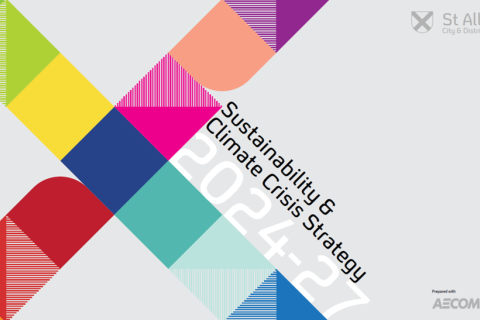Natural Environment & Biodiversity - Our Actions
The natural environment is an asset to everyone in the District which requires preservation and protection. Over the past 40 years we have lost 60% of mammals, birds, fish, reptiles, and amphibians as a result of changing temperature and rainfall patterns and rapid urban and agricultural development. In the UK, 60% of the 3,000 species that have been studied have declined over the past 50 years. This is not just a loss for the interconnected ecological systems that depend upon these species, it’s a loss for us. It is imperative that habitats are restored and protected wherever possible so that there is a net-gain in wildlife value.
We are doing what we can to ensure that our activities support and enhance ecological biodiversity wherever possible and have committed to the following overarching objectives and actions through our Sustainability and Climate Crisis Strategy 2024-2027. This page sets out the progress we have made so far in relation to each objective. It will be updated periodically.

Make our land more wildlife friendly and help it cope with extreme weather events such
as drought and flooding.
- NEB1 Manage Council land to promote climate resiliency, support biodiversity and maximise carbon sequestration.
What we will do:
- Ensure rewilding principles that enhance biodiversity are incorporated into new developments and existing assets where possible.
- Ensure parks, green spaces and recreational facilities are managed to increase biodiversity value, rewild and create new habitats.
- Ensure new Council planting schemes include plants and trees that are tolerant to pests and climate change.
What we have achieved so far:
- Council successfully obtaining £40,000 funding for new trees through Local Authority Tree Fund and Urban Tree challenge Fund.
- All new construction projects are assessed for rewilding opportunities and biodiversity enhancements at the pre-planning stage.
- Swift boxes have been installed to the District Offices.
- Biodiversity audit looked at where we can increase biodiversity in all open spaces and significant highway verges.
- We continue to survey sites for meadow enhancement tree planting and hedgerow planting.
- 10 sites, making up 50,000 m2 were selected for wildflower seeding in the last 2 years.
- Glyphosate-free streets trialled involving 90 people who manually weeded the streets.
- We only use trees with tree passports to maintain biosecurity.
- Flower beds are now planted with a perennial seed mix to reduce need for replanting each year and excess watering.
- Annual tree panting scheme includes only plants and trees that are resilient to climate change and pollinator friendly.
- Since 2020 we have planted over 6,000 trees in our open spaces.
- New management plans continue to look at opportunities to increase biodiversity.
- SADC Opportunities Audit has been undertaken to increase biodiversity in all open spaces and significant highway verges.
- Since 2022 we have given away 16,000 trees as part of the Herts County Council free tree giveaway initiative. 11,000 tree's were given to residents in 2024/25.
- 110 standard trees have been planted to replace felled trees.
- 2055 whips have been planted for hedgerows.
- 33,668 m2 meadow created.
- Four Green Flag Awards on our parks and Green Spaces.
 We will work with others to help the natural environment cope with the changing climate including extreme weather, storms, drought, and flooding
We will work with others to help the natural environment cope with the changing climate including extreme weather, storms, drought, and flooding
- NEB2 Work with communities, landowners, partners and local groups to make the natural environment more resilient to climate change.
What we will do:
- Work with Hertfordshire County Council and local communities to retain existing street trees and vegetation that provide important cooling effects and develop projects for new planting.
- Set out guidance on greening within public realm schemes to help enhance carbon sinks and provide climate resilience benefits as well as biodiversity co-benefits.
- Ensure new developments include climate resiliency measures that support the natural environment including drought-resistant planting and connected green infrastructure through Local Plan policy.
Achievements so far:
- Over 300 trees planted to replace trees felled by Herts County Council.
- Climate Risk Register requires all new Council developments to have due regard for climate adaptation.
- Local Plan hearing is underway April 2025.
 Work with others to increase biodiversity
Work with others to increase biodiversity
across the District. Support projects to
restore and create new areas for wildlife to live and thrive
- NEB3 Work with partners and communities to identify areas with opportunities to improve biodiversity and create new habitats.
What we will do:
- Work with our partners to implement the environmental actions of the Green Spaces Management Plan. and engage and educate the public on the value of conservation and habitat management. This includes the use of pesticides and pollution control.
- Develop Planning Policy to mandate developments to support biodiversity, tree planting and encourage the creation of wildlife habitats and corridors.
- Implement the actions and objectives set out in the updated Tree Strategy and work with the County Council to manage grass verges and trees along highways, and to reduce the use of glyphosate.
- Work with the Local Nature Partnership to help deliver the Nature Recovery Strategy.
- Progress the 'Revitalise the River Ver' project to transform and naturalise the River Ver and improve it's biodiversity.
- Remain open to requests to review the opportunity for creating pocket gardens, promoting tree planting and / or food growing on Council or third-party land.
- Work with the Joint Allotment Group to implement and uphold the allotment rules concerning pesticide use.
- In line with the strengthened biodiversity duties introduced by the Environment Act 2021, we will review the actions we can take to conserve and enhance biodiversity and periodically publish a report detailing progress.
Achievements so far:
- We have supported the development of 3 community food growing and wildlife gardening spaces by Incredible Edibles and Grow Sopwell.
- Wilder St Albans project delivered 200 actions across the community including 31 ponds and 1 hectare of grassland created, 5 ponds improved for wildlife and 101 volunteers involved.
- 42 swift bird boxes have been installed, including at the District Offices.
- A bespoke peregrine breeding tray has been fitted on St Albans Cathedral which is being used.
- A strategy has been developed to allow Wilder St Albans to continue despite there being no more funding. This will include distribution of information to local people, liaising with local and national groups and maintaining a database that can be used to promote volunteering and monitoring.
- Jersey Farm open space is to be improved for nature with a lake, forest and cycle tracks.
- HMWT and HCC are regularly attend SADC Tree Planting officers meetings to exchange ideas and help coordinate 'rewilding' work with tree planting work.
- Herts and Middlesex Wildlife trust have successfully reintroduced Watervole on the River Ver and water voles activity has been seen in Verulamium Park and Sopwell Nunnery Green Space.
- We are leading on community engagement work around the Local Nature Recovery Strategy.
- The Tree Strategy has been reviewed and published.
- Trialed reducing the mowing on highway verges to allow more meadow area and support biodiversity where appropriate. Trials were successful and HCC has now agreed to roll this out accross more sites.
- Successfully trialled of glyphosate-free streets with HMWT and Wilderhood Watch Group. Feedback has been positive and we now seek further groups and streets to extend the scheme.
- In 2024 Countryside Management Service mid-week practical conservation volunteer teams have been working across a number of sites in the district, providing 1377 hours of volunteer work. Friends Groups in the District contributed 1496 man hours to local conservation.




